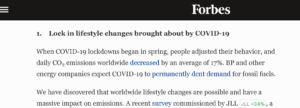Hat tip: Watts Up With That: Forbes Climate Crisis: “Lock in lifestyle changes brought about by COVID-19”
We Need An Operation Warp Speed To Battle Climate Change
By Wal van Lierop – A venture capitalist & sustainability and cleantech entrepreneur
Dec 19, 2020
When I wrote about the new Roaring 20s last December, the world was largely unaware of COVID-19. Although the pandemic has caused indescribable tragedy and hardship, it has also shown that with proper motivation and financing, humanity can do the impossible. That scientists developed safe, effective COVID-19 vaccines in less than a year is evidence of our untapped potential to solve global problems.
The lesson for climate change is that if we act with equal vigor, we can solve this crisis. But we need an Operation Warp Speed for the Climate. Thanks to the European and South Korean Green Deals and President-elect Joe Biden’s $2 trillion climate plan, the world is positioned to do it. Just as the original Operation Warp Speed met the need for timely new treatments and vaccines, this operation would deliver game-changing innovations for our climate crisis.
…
Lock in lifestyle changes brought about by COVID-19
When COVID-19 lockdowns began in spring, people adjusted their behavior, and daily CO2 emissions worldwide decreased by an average of 17%. BP and other energy companies expect COVID-19 to permanently dent demand for fossil fuels.
We have discovered that worldwide lifestyle changes are possible and have a massive impact on emissions. A recent survey commissioned by JLL JLL +0.6%, a commercial real estate company, found that 72% of office workers want a hybrid model in which they continue work at home several days per week after the crisis ends. A quarter want to continue working remotely full time. Let’s lock those changes in to reduce commuter pollution. Meanwhile, we need a way to get people safely back onto public transport (its usage is down). And for cases where transportation is unavoidable or has even increased, like with online shopping and freight shipping, it’s time to scale electric trucks and hydrogen-powered cargo ships.
While we’re at it, let’s ensure that business travel never returns to its former excesses. Most of the time, there’s no reason to take one-day trips across the globe. Regular business meetings can be done more efficiently virtually, complemented by in-person contact only once in a while.
Governments could cement these lifestyle changes with tax deductions and by finally ending fossil fuels subsidies, as I wrote last year. In response, people would reduce their fossil fuel usage, and innovators would develop carbon-free alternatives sooner than they would otherwise. If a deadly virus changed our lifestyle at Warp Speed, why can’t a deadly climate crisis do the same?
#
Eric Worrall WattsUpWithThat.com responds:
What about nuclear fission Wal van Lierop? Van Lierop mentions nuclear fusion research, but like most greens he completely ignores nuclear fission.
We know nuclear fission works. France decarbonised their economy in the 1970s, by replacing most of their fossil fuel plants with nuclear. They still get around 75% of their electricity from nuclear plants.
Rather than imposing permanent Covid-19 style climate lockdowns, the entire world could copy what France did in the 1970s. In as little as a decade, we could reduce anthropogenic CO2 emissions by at least 30%, with no lifestyle sacrifices whatsoever.
But for some reason hardline greens like van Lierop would apparently rather have us locked in our homes and local towns like sheep in pens, than promote a viable zero carbon option which allows us keep our current lifestyles.





